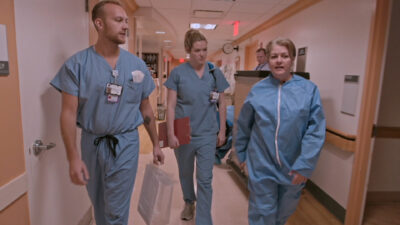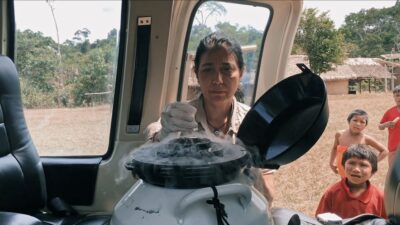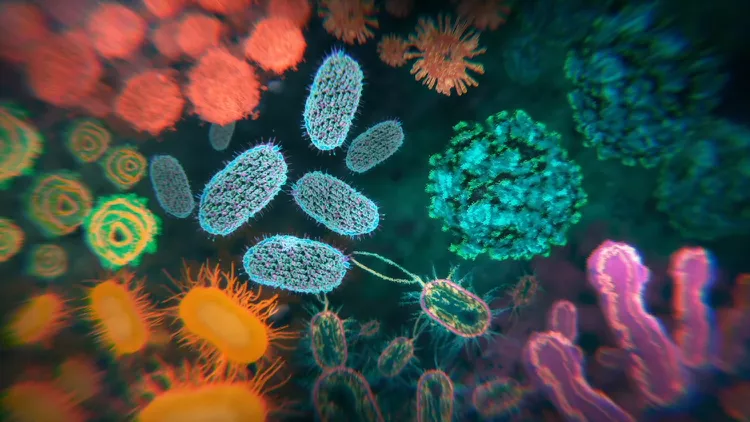The Invisible Extinction is the film that Sarah Schenck wishes she had seen before having her children. The documentary investigates the impact antibiotics have on our microbiome and how their overuse has led to a rise in modern-day food allergies, amongst other afflictions. “Sometimes you really need to take antibiotics, and they’re miracles. But what our film wants to explore is the collateral damage,” the co-director tells me, from her home in Brooklyn.
Schenck’s devotion to the subject began many years ago, when her youngest daughter suffered a life-threatening reaction after eating a cookie. It was a traumatic 24 hours that left the family with many questions. What puzzled Schenck the most was that her children had already been tested for allergies, and her youngest had been cleared. “We have the most miraculous, sophisticated advanced medicine and yet nobody knows why my kid suddenly became allergic to pecans and almost died.”
Immediately following the incident, Schenck turned to the internet for answers. “I went home and was Googling frantically and pretty soon I came across research that showed that there’s more and more evidence that our overuse of antibiotics is messing up and destroying our internal ecology.”
That initial hunt to understand her daughter’s near-fatal reaction turned into 10+ years of research, eventually leading Schenck to make The Invisible Extinction with co-director Steven Lawrence. Lawrence also had personal reasons for exploring the subject matter: he believes he developed irritable bowel syndrome and food intolerances after taking medically unnecessary antibiotic prescriptions.
“It was alarming for me to learn that around half of all antibiotic prescriptions in the United States are useless,” says Schenck, with a sense of urgency in her voice. “People are being prescribed antibiotics for things that aren’t going to respond to them. So you’re doing more harm to your immune system with no potential for benefit.”

Another shocking fact is that by age three, most kids in North America have had three courses of antibiotics. When a kid gets sick, family life can turn upside down. It’s understandable that parents want a quick fix, especially when their child is experiencing discomfort or not sleeping. But antibiotics aren’t always the answer, and aren’t even effective for infections caused by viruses (colds, flus, ear infections).
“I wish I had known when I was about to become a mom that antibiotics are great, and definitely need to be used in certain situations, but in a lot of conditions, it’s okay to ask your doctor ‘Would it be okay if I waited a day or two? A lot of times, infections resolve on their own.”
In The Invisible Extinction, we meet a variety of scientists and experts, including microbiologists Martin J Blaser and Maria Gloria Dominquez-Bello, endocrinologist Elain Yu, and immunologist & pediatrician Toala Chatilla, to name a few. Each has a lot to say about the overuse of antibiotics—not just what it’s doing to our bodies, but also to the overall effectiveness of the antibiotics. “We’re losing the use of our antibiotics because of drug resistance, and the bad bugs are learning about our antibiotic arsenal,” warns Schenck.

The documentary comes at a time when a lot of people are paying more attention to their gut; You can barely go 2 minutes on TikTok without being met by an in-your-face “gut expert”, who lists off diet recommendations and supplements in order to achieve an optimal poo. But Schenck reminds me that, like our ocean waters, the human microbiome is still largely unknown.
“You can go and buy hundreds of kinds of probiotics right now – cheap, expensive, refrigerated and not refrigerated – there are a thousand different varieties that are basically not tested.”
But Schenck feels hopeful that we’re going to see some scientific breakthroughs soon. “I do believe there are going to be next generation probiotics, for people with food allergies and asthma. It’s not tomorrow, but it’s on the horizon.”
The Invisible Extinction is loaded with fascinating science, but facts and findings are parceled in an easy-to-digest way and shared alongside real-life case studies, including jaw-dropping breakthrough procedures like fecal transplants as a way to cure chronic illnesses.
Audiences will be inspired to examine their own relationship with antibiotics, likely find clues to their own peculiar ailments, and think about their bodies in a whole new way. “We need to protect our microbes—they are our oldest friends!”
The Invisible Extinction is now streaming on a variety of platforms. Groups interested in hosting an in-person or virtual screening at their workplace or school are encouraged to get in touch.



 Follow Us On Instagram
Follow Us On Instagram
